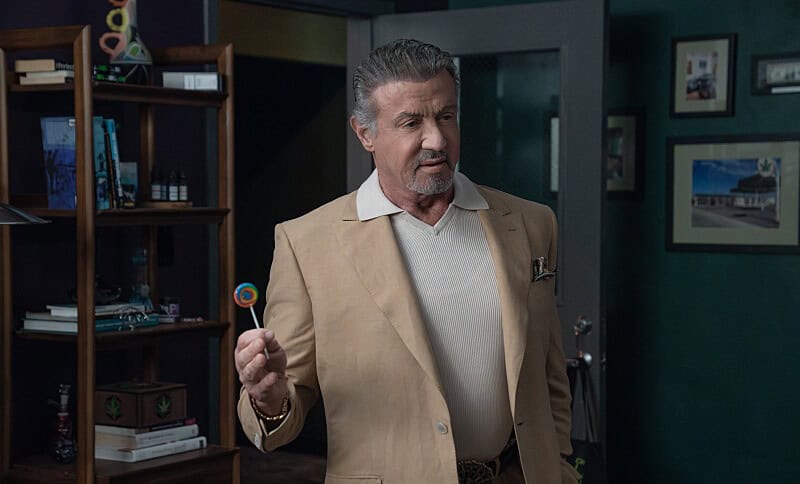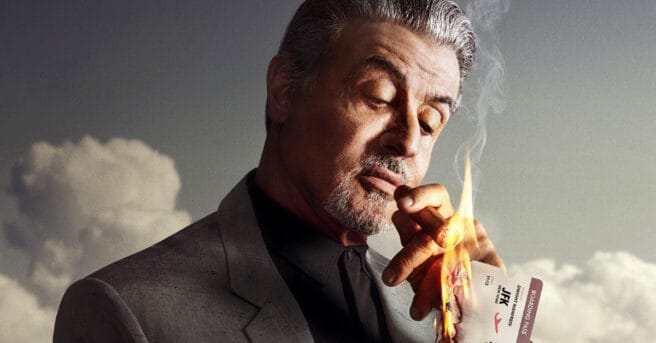

Plot: Dwight and his crew continue to build up and defend their growing empire in Tulsa, but just as they get their bearings, they realize that they’re not the only ones who want to stake their claim. With looming threats from the Kansas City mob and a very powerful local businessman, Dwight struggles to keep his family and crew safe while keeping track of all his affairs. Plus, he still has unfinished business back in New York.
Review: Taylor Sheridan has diversified his retinue of television series beyond the world of Yellowstone to include historical epics, Michigan-set crime stories, and this unique tale set in Oklahoma. The first season of Tulsa King was a welcome small screen project for big screen star Sylvester Stallone, who embodied Dwight Manfredi as a New York fish out of water in the Midwestern city of Tulsa. With a new local crew, Dwight’s exploits were a nice blend of comedy and action, vastly different than any other Sheridan-produced project. With the second season, Taylor Sheridan’s influence has diminished. At the same time, Winter and Stallone’s creative input has increased, creating a solid evolution for the series from mafia drama to a distinct foray into a familiar genre thanks to new antagonists in Frank Grillo and Neal McDonough.
At the end of the first season of Tulsa King, Dwight (Sylvester Stallone) had amassed a nice crew in Oklahoma and began cornering the weed business to the chagrin of new boss Chickie Invernizzi (Domenick Lombardozzi), who killed his father, Pete (A.C. Peterson) to take over the family business. With his sights set on getting rid of Dwight, Chickie may be in luck as a gift given to ATF agent Stacy Beale (Andrea Savage) gets Dwight arrested on bribery charges. As season two opens, Dwight is in jail, his crew scrambles to get him out, and Tulsa is unprepared to learn they have a mobster in town. Over the first three episodes of the new season, Dwight prepares to go to trial while learning about new avenues to expand his business interests in the Midwest, including wind farms, car dealerships, and more. This leaves Chickie irate back in New York while also creating rifts inside Dwight’s crew.
While I have only seen the opening episodes of Tulsa King‘s sophomore run, the series has already included substantial improvements that have shifted the story from another variation on the Yellowstone formula into a new take on the familiar tropes of mobster narratives. The culture shock of a New Yorker relocating to a suburban and rural environment has been done before in films like My Blue Heaven. Still, the tone and style of Tulsa King is ripe for giving us a metropolitan area rarely seen in mainstream programming. Like the Albuquerque of Breaking Bad and Better Call Saul, the Tulsa that Dwight now calls home is a blend of the cowboys like on Yellowstone and the gangsters like in The Sopranos, all wrapped with a sense of humor. The first episodes this season offer some good chuckles, mainly from Stallone himself, as well as the new and returning cast that includes Martin Starr, Jay Will, Max Casella, and Garrett Hedlund.

The two new antagonists this season are Kansas City gangster Bill Bevilaqua, whose territory includes Tulsa and whose family is in competition with the Invernizzi clan, and Cal Thresher, the local Tulsa businessman whose business Dwight is encroaching on. Frank Grillo has been a fan favorite in recent years due to his countless action movies and his inclusion as Crossbones in the Marvel Cinematic Universe. Grillo has the right grittiness as Bevilaqua, a solid counter to Stallone’s energy. Neal McDonough equally serves as a sinister force, something he has become recognized for after portraying villain Damien Darhk on The Flash and Arrow, Robert Quarles on Justified, and Malcolm Beck on Taylor Sheridan’s own Yellowstone. Thanks to their local presence in Tulsa this season, both will certainly present a stronger opposition to Dwight’s plans. On the more positive side, Dana Delany gets a stronger role this season as she takes over the main interest role opposite Dwight now that Andrea Savage’s Stacy Beale has been revealed as an ATF agent.
While the first season saw five directors helming nine episodes, the second season employs Craig Zisk (Halo, Interview with the Vampire) on multiple episodes, with Joshua Marston (Ray Donovan, Billions) and Kevin Dowling (The Americans, Mayans MC) tackling entries as well. Rather than have a conventional showrunner, Tulsa King‘s second season has Zisk overseeing the series as director and executive producer. Terence Winter, who left after a season one rift between himself and Taylor Sheridan, returned to help script the second season but outside of the direct supervision of Taylor Sheridan. As such, Sheridan has no writing credits this season, while Winter wrote one episode and collaborated on six episodes, two of which were co-written by Sylvester Stallone. The odd arrangement between writers and directors does not impact the finished product as this season feels a bit more balanced than the first as it continues to forge a distinct voice from the Sheridan-produced series that came before it.
While the behind-the-scenes tension and controversy leading up to Tulsa King‘s premiere made me concerned about how the new episodes would turn out, I am happy to report the series is as good if not better than last season. Sylvester Stallone is fully engrained in playing Dwight Manfredi, and his energy and sense of humor are only rivaled by his intensity as the new boss of Tulsa, Oklahoma. With Frank Grillo and Neal McDonough already proving to be worthy adversaries, this new season further distinguishes itself from other Taylor Sheridan-created series rather than getting lumped in as another show from the guy who made Yellowstone. Tulsa King is violent, funny, and the best mob series to hit the air since The Sopranos.
Tulsa King‘s second season premieres on September 15th on Paramount.
The post Tulsa King Season 2 TV Review: Sylvester Stallone is back kicking Oklahoma into shape appeared first on JoBlo.

Leave a Reply